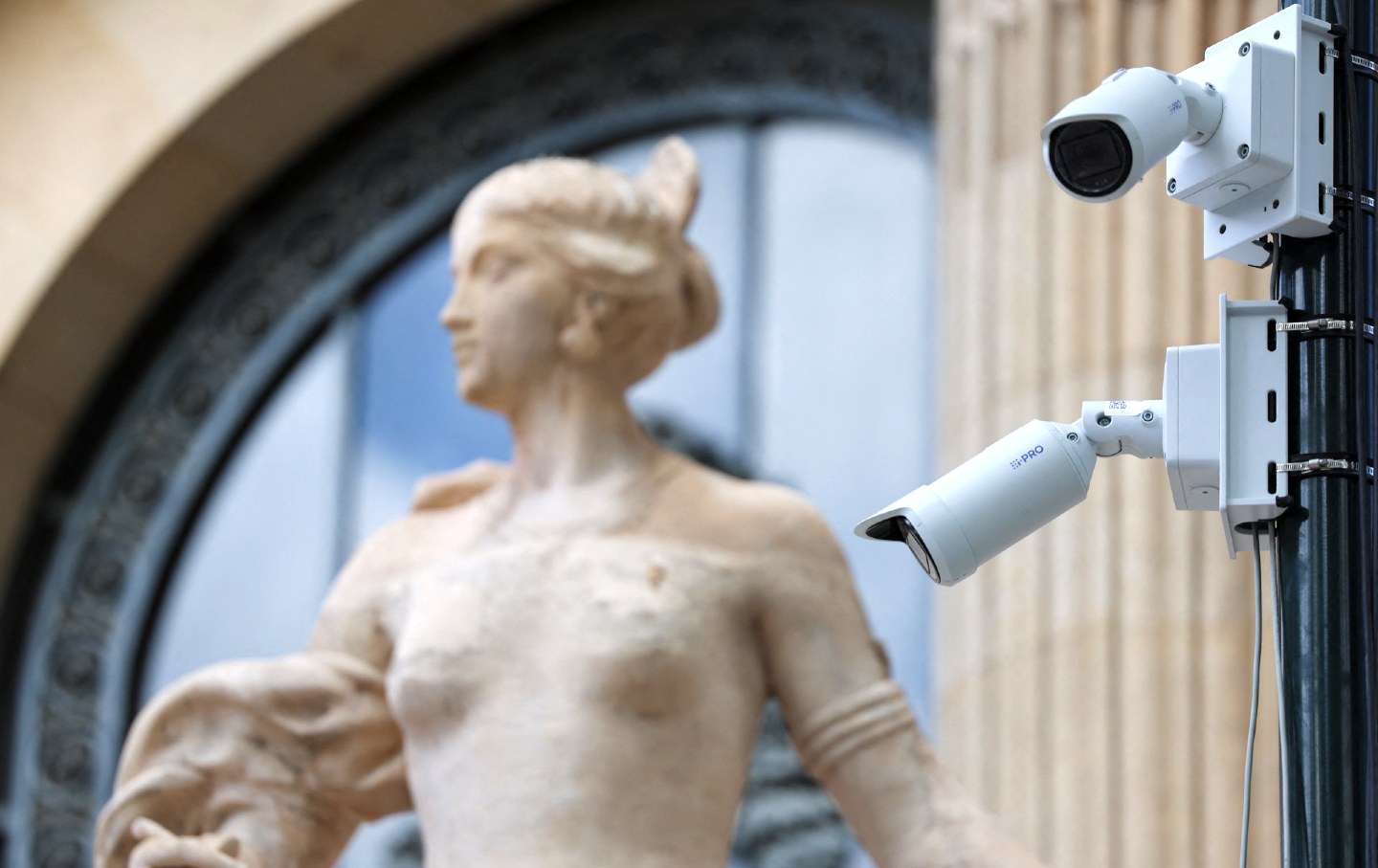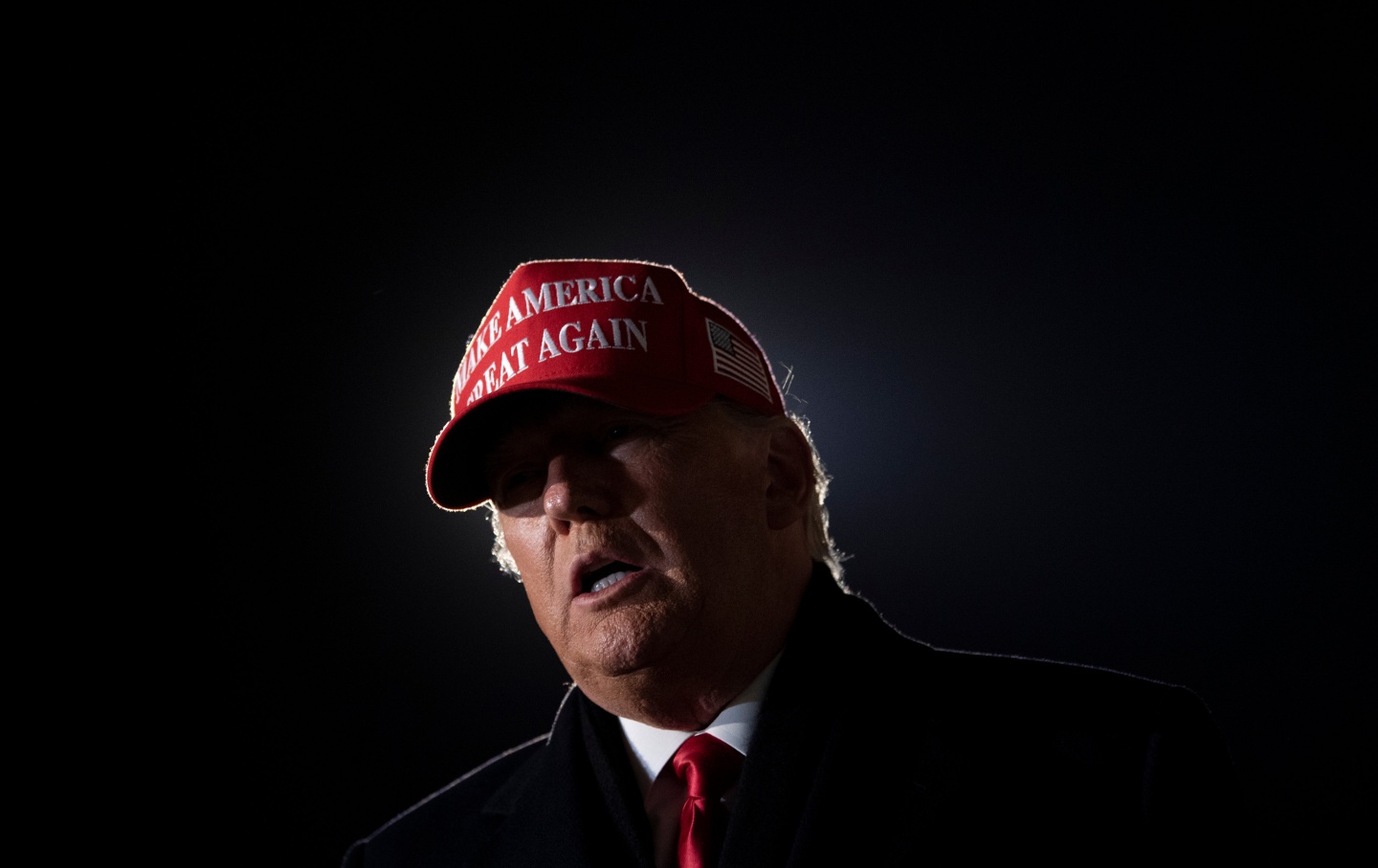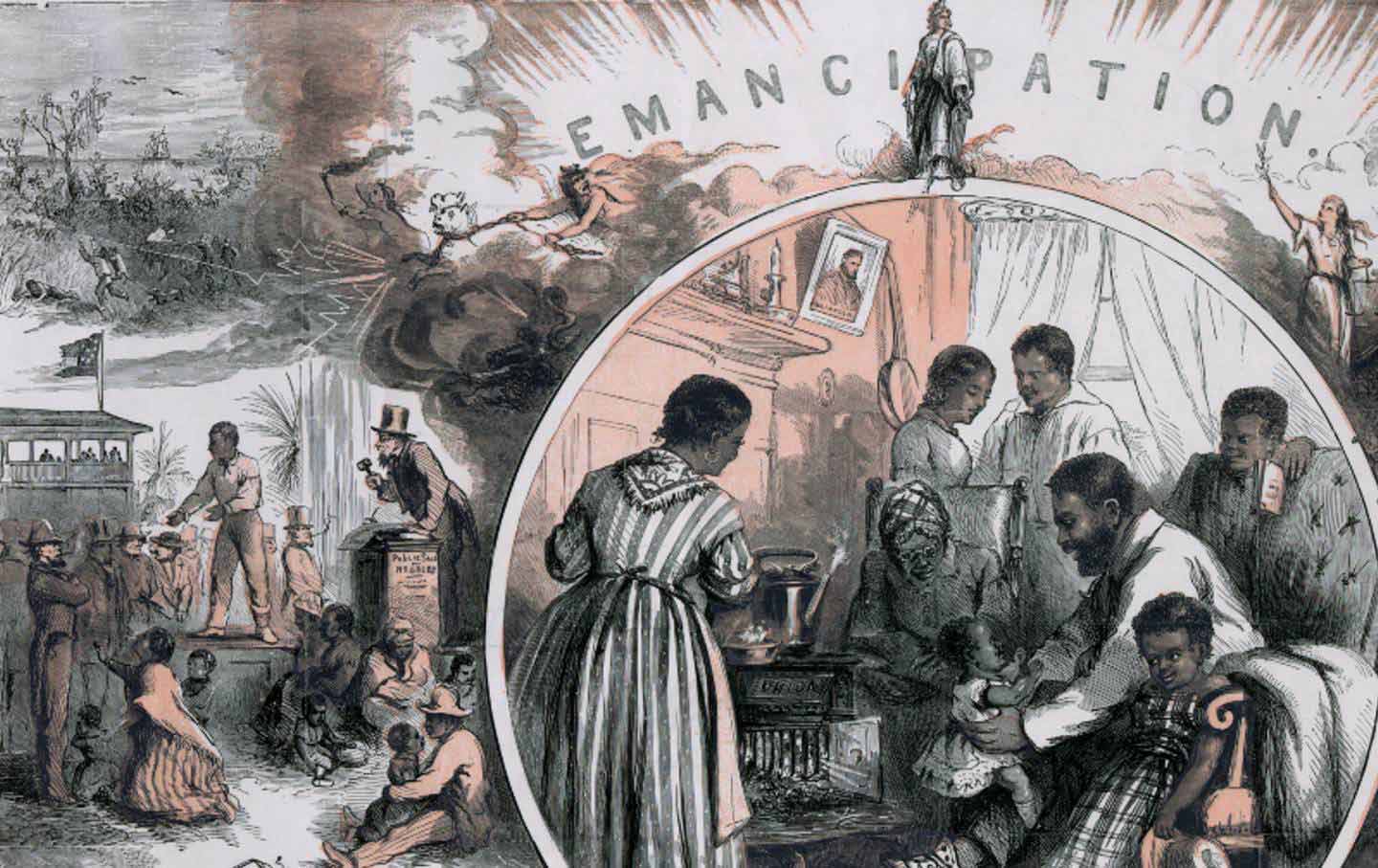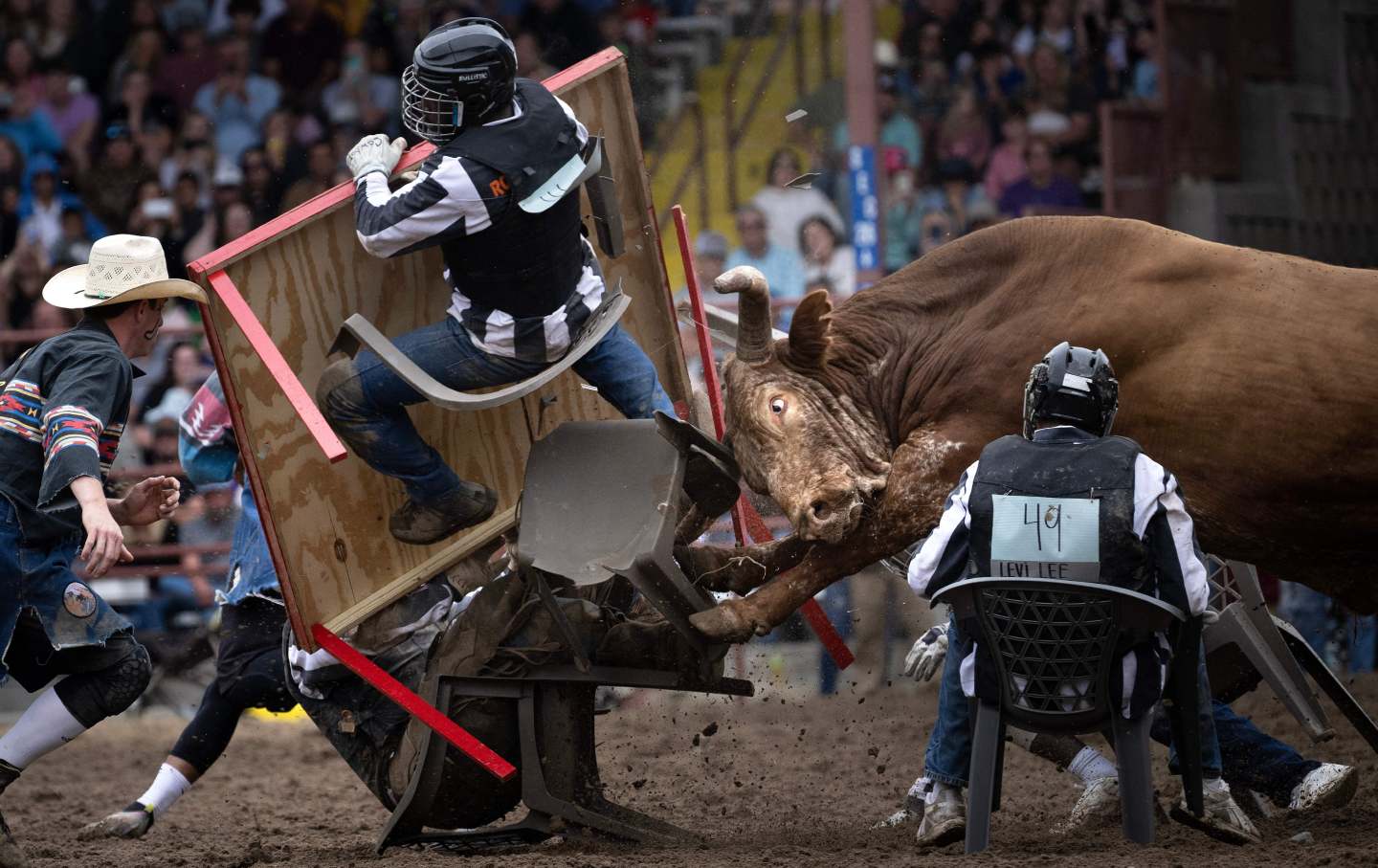The Olympics Have Turned Paris Into a Panopticon
The omnipresent high-tech surveillance introduced for the Games normalizes incursions on civil liberties.

A CCTV surveillance camera watches the Olympic crowds with a statue of the Grand Palais Olympic site in the background in Paris on July 22, 2024.
(Emmanuel Dunand / AFP via Getty Images)
Noah Farjon, a Paris activist with the counter-Olympics organization Saccage 2024, was about to escort two journalists through the community of Saint Denis on what they call a Toxic Tour. Saccage 2024 has organized these informational tours to show the media the impact of the Paris 2024 Summer Olympics on working-class communities. Before they were able to begin, four police cars blocked them as they emerged from the Saint Denis-Porte de Paris Metro stop, and a platoon of heavily armed officers encircled them. After performing an identity check and search, the police found counter-Olympics leaflets and stickers. The gendarmes then arrested them—including the media members—and took them into custody, where they remained for 10 hours. After his release, Farjon told us that the Paris Olympics have brought on “a lockdown on dissent” and that “Paris is basically under occupation.”
Everything we are seeing bears this out. While people will remember Céline Dion’s rendition of “L’Hymne à l’Amour” at the opening ceremonies, the real soundtrack to the Olympic Games is a police siren.
Security for the Paris Olympics is the shadow spectacle to the sporting spectacle. The Games have given rise to the largest military presence in the city since World War II, with around 10,000 soldiers ensconced in a centralized military camp in close proximity to all the Paris Olympic venues. Another 45,000 police and gendarmes patrol the city, and that doesn’t even count the 20,000 private security guards.
The Olympic Games not only bring together athletes from around the world; they increasingly unite the world’s security forces. The policing of Olympic Paris includes nearly 2,000 security officials from around 40 countries. Most are from Europe, but there are also forces from Brazil, Canada, Chile, Ireland, Morocco, Qatar, and South Korea. Media accounts of foreign police officers—such as Irish gardaí—offering a “friendly face” to help tourists find where they need to go belie the intensity of the security presence in Olympic Paris. Walking around the city often feels like attending an international policing convention.
In addition, an alphabet soup of US intelligence agencies have also helped prepare Paris’s policing agenda, from the CIA, FBI, and NSA, to obscure organizations like the US National Geospatial-Intelligence Agency and the Overseas Security Advisory Council.
The deeply unpopular French President Emmanuel Macron and International Olympic Committee head Thomas Bach say that such measures are necessary to keep athletes and fans safe from terrorism. But that same security architecture can be turned against activists expressing their political beliefs. This is especially the case with the AI software being used throughout Olympic Paris.
In March 2023, the French National Assembly passed the Olympic Games Law, which greenlighted algorithmic video surveillance. This not only etched the technology into French law but made France the first country in the European Union to do so. Using advanced software, algorithmic video surveillance speeds up the processing and analysis of CCTV imagery based on human inputs that narrow the technology’s focus. For example, algorithmic video surveillance can be programmed to target behaviors such as people wearing all-black, individuals moving in an erratic way, or even inanimate objects on the ground.
Noémie Levain, an attorney with La Quadrature du Net, a Paris-based digital rights group, told us that the Olympics were a convenient pretext for fast-tracking the technology. She said that algorithmic video surveillance is a tool for the police “to enhance social control on public space.” AI-driven video surveillance “can discriminate,” she said, both “technologically and politically,” allowing security forces to zero in on political activists, migrants, and unhoused people.
She pointed out an important “hypocrisy”: that the experimental technology has been sold to the public for use at the Olympics, but that “it started before [the Olympics] and will end [long] after.” Moreover, French policing officials have already deployed it at concerts, festivals, and other sporting events.
The Olympic Games Law also carves out political space to advance subsequent bills that include facial recognition technologies. In other words, the law, passed amid the Olympic state of exception, may well be the gateway drug to demonstrably racist technology. (Racist policing is an issue France already knows all too well.) Moreover, although the law is slated to sunset in March 2025, it does not take the imagination of Henri Matisse to conjure scenarios through which the French state will endeavor to extend the technology’s use.
Surveillance is not only being used to go after marginalized groups; the entire city is a panopticon. Surveillance technology has been used to monitor French workers hoping to earn a wage as part of the Olympic Games, from bus drivers to entertainers to first-aid providers. According to Levain, nearly a million prospective workers had their digital histories scoured before being employed, with many being deprived of employment if they were found to have attended demonstrations, been arrested at protests, or done anything that could be perceived as resistance to the French state. This was about politics as much as security.
To be clear, this is not a Paris issue as much as it is an Olympic issue. Security officials in the Olympic city have long used the Games to multiply and militarize their forces. The Games have become a high-tech playground for soft-launching invasive security technologies. This serves to normalize what should be abnormal policing practices, softening up the population for the next round of incursions on civil liberties.
Olympic boosters often defend handing the Games to authoritarian regimes because they say they are bringing democratic values to undemocratic spaces. But far from making autocracies less vicious, the Olympics are making Paris feel more like an autocracy.
We cannot back down
We now confront a second Trump presidency.
There’s not a moment to lose. We must harness our fears, our grief, and yes, our anger, to resist the dangerous policies Donald Trump will unleash on our country. We rededicate ourselves to our role as journalists and writers of principle and conscience.
Today, we also steel ourselves for the fight ahead. It will demand a fearless spirit, an informed mind, wise analysis, and humane resistance. We face the enactment of Project 2025, a far-right supreme court, political authoritarianism, increasing inequality and record homelessness, a looming climate crisis, and conflicts abroad. The Nation will expose and propose, nurture investigative reporting, and stand together as a community to keep hope and possibility alive. The Nation’s work will continue—as it has in good and not-so-good times—to develop alternative ideas and visions, to deepen our mission of truth-telling and deep reporting, and to further solidarity in a nation divided.
Armed with a remarkable 160 years of bold, independent journalism, our mandate today remains the same as when abolitionists first founded The Nation—to uphold the principles of democracy and freedom, serve as a beacon through the darkest days of resistance, and to envision and struggle for a brighter future.
The day is dark, the forces arrayed are tenacious, but as the late Nation editorial board member Toni Morrison wrote “No! This is precisely the time when artists go to work. There is no time for despair, no place for self-pity, no need for silence, no room for fear. We speak, we write, we do language. That is how civilizations heal.”
I urge you to stand with The Nation and donate today.
Onwards,
Katrina vanden Heuvel
Editorial Director and Publisher, The Nation
More from The Nation

Mr. Scarborough Goes to Mar-a-Lago Mr. Scarborough Goes to Mar-a-Lago
The hosts of Joe Biden’s favorite political talk show have quickly pivoted to kissing the ring of the incoming president.

Watching a Parallel Media Try to Make Trump the Big Sports Story Watching a Parallel Media Try to Make Trump the Big Sports Story
The president-elect did not dominate the world of sports this weekend, but Fox News and Internet tabloids are inventing new realities.

The First Amendment Will Suffer Under Trump The First Amendment Will Suffer Under Trump
Given what’s heading our way, we need a capacious view and robust defense of the First Amendment from all quarters.

Slavery in an Age of Emancipation Slavery in an Age of Emancipation
Robin Blackburn’s sweeping history of slavery and freedom in the 19th century.

How Wisconsin Lost Control of the Strange Disease Killing Its Deer How Wisconsin Lost Control of the Strange Disease Killing Its Deer
Despite early containment efforts, chronic wasting disease has been allowed to run rampant in the state. That’s bad news for all of us.

The Prison Rodeo at the Heart of Legal Enslavement The Prison Rodeo at the Heart of Legal Enslavement
Angola prison workers make between 2 and 40 cents an hour. They also have a controversial outlet for recreation and to vend their wares at market rate: a rodeo.


